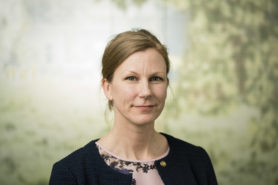News
Meet our new PI: Ellen Hamaker
I hope that my role in CID will be one in which cross-fertilization between statistics and substantive fields can prosper

I am a professor of Longitudinal Data Analysis at Utrecht University (Methodology and Statistics Department of the Faculty of Social and Behavioral Sciences). Although I obtained my master’s degree in clinical psychology, I fell in love with statistics during a course on Structural Equation Modeling (SEM). For my PhD I focused on the use of time series techniques from econometrics and engineering to analyze long sequences of N=1 daily diary or observational data. This was rather challenging: The time series literature is clearly not written for psychologists and can be quite hard to digest, and psychological time series data were rare back then.
After receiving my PhD in 2004 from the University of Amsterdam, I spent a year as a post doctoral fellow at the University of Virginia. Then I joined the Methodology and Statistics Department in Utrecht. A VENI (2005), VIDI (2011), and Talent grant (2015) gave me the opportunity to build a research group (Dynamic Modeling Lab). During this time, technological developments such as smart phones and other wearable devices made it much easier to obtain frequent repeated measures from people while they are living their daily life. As a result, the demand for statistical techniques that can handle such intensive longitudinal data accelerated. Since 2015, I have been collaborating with the software company Mplus to develop Dynamic Structural Equation Modeling (DSEM), which facilitates the use of N=1 time series analysis and multilevel extensions of these (see short clip here).
Besides my work on intensive longitudinal data, I also focus on more traditional panel research with a small number of repeated measures. My best known contribution in this area is our 2015 publication on the random intercept cross-lagged panel model (RI-CLPM), which we proposed as an alternative to the popular cross-lagged panel model. The idea behind the RI-CLPM is that you should separate the within-person (or within-family) dynamics from the stable between-person (or between-family) differences. This idea clearly resonates with the way psychologists and other social scientists think about many of the phenomena they study.
I firmly believe in cross-fertilization between statistics and substantive fields: While questions of substantive researchers inspire me to develop new techniques, the opportunities that are offered by statistical innovation can inspire new research questions. I hope that my role in CID will be one in which this cross-fertilization can prosper.
If you want to hear more about my ideas, you can come to my inaugural speech (in Dutch), which will take place on Friday April 12 in Utrecht (right after Andrik Becht’s thesis defense). Moreover, if you are interested in enhancing your statistical skills, make sure to check out our postgraduate courses (www.uu.nl/sbs/postgraduatems).
